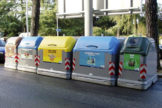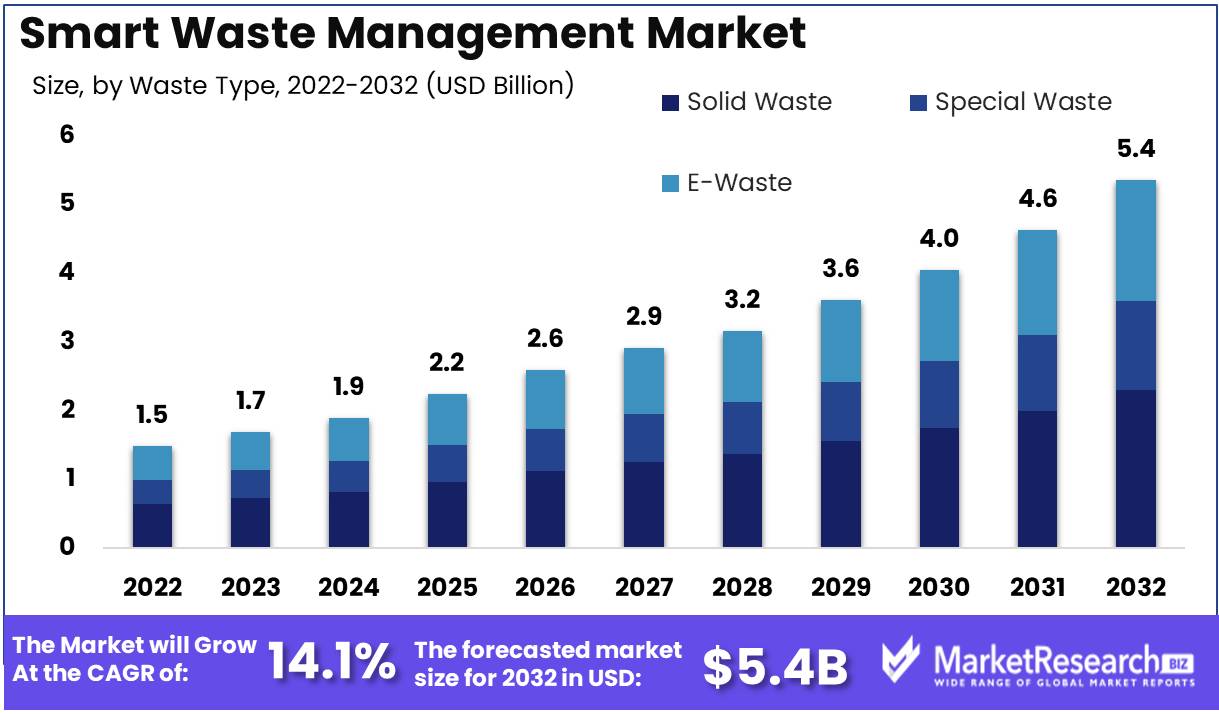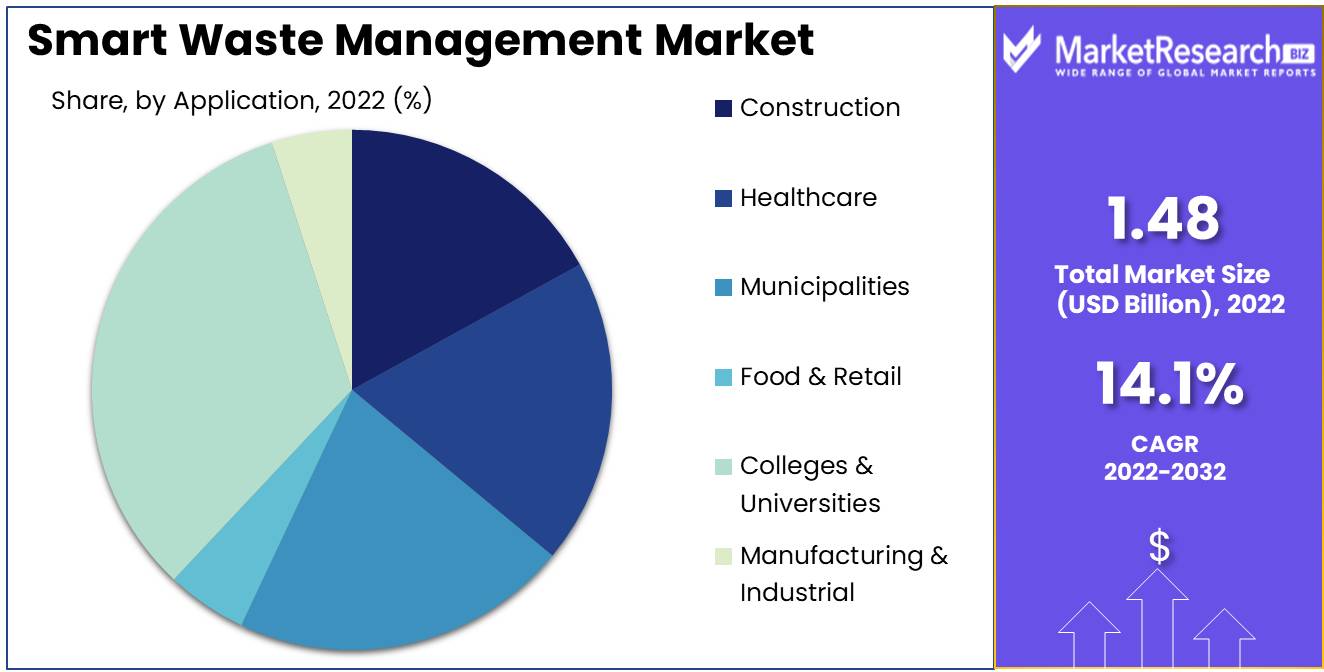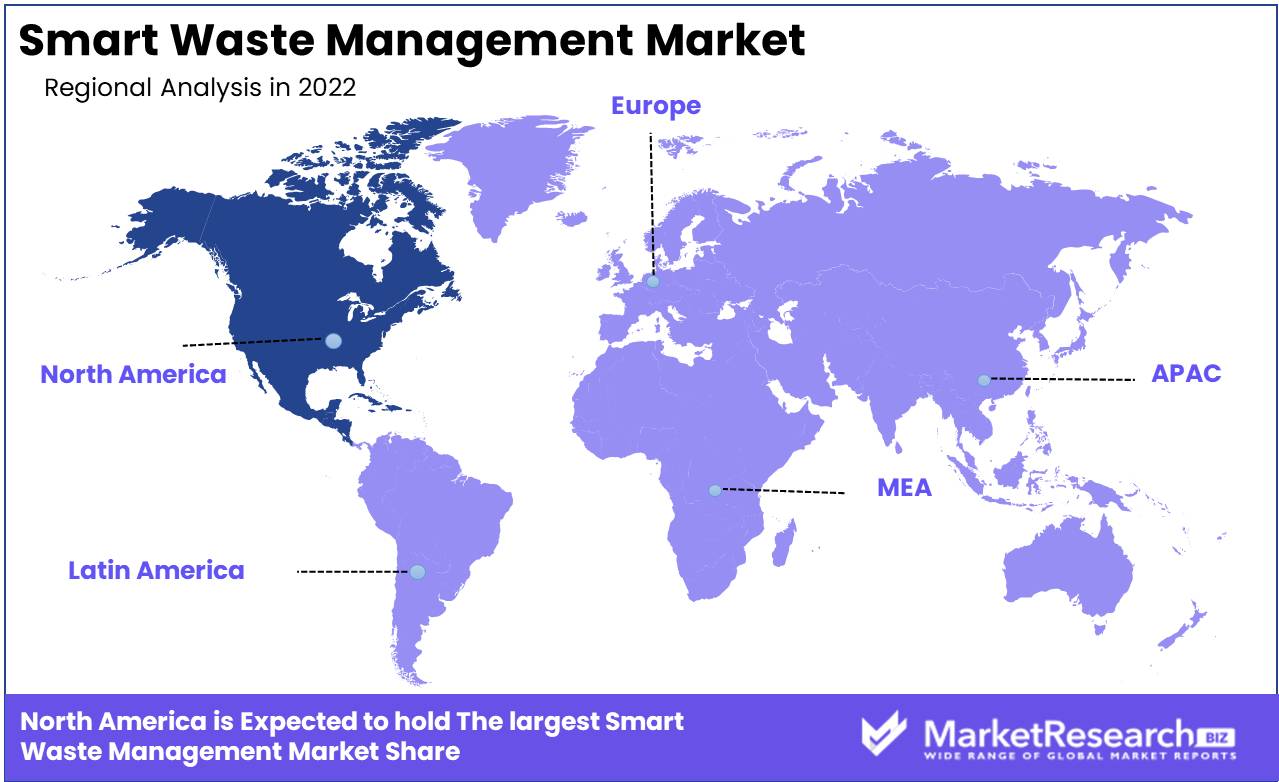
Smart Waste Management Market By Waste Type(Solid Waste, Special Waste, E-Waste) By Source(Residential, Commercial, Industrial), By Application(Construction, Healthcare, Municipalities, Food & Retail, Colleges & Universities, Manufacturing & Industrial), By Region And Companies - Industry Segment Outlook, Market Assessment, Competition Scenario, Trends, And Forecast 2023-2032
-
9512
-
Jul 2023
-
190
-
-
This report was compiled by Correspondence Linkedin | Detailed Market research Methodology Our methodology involves a mix of primary research, including interviews with leading mental health experts, and secondary research from reputable medical journals and databases. View Detailed Methodology Page
-
Quick Navigation
Report Overview
Smart Waste Management Market size is expected to be worth around USD 5.53 Bn by 2032 from USD 1.48 Bn in 2022, growing at a CAGR of 14.1% during the forecast period from 2023 to 2032.
Smart waste management is an innovative concept that aims to transform the conventional approach to waste management. This innovative concept optimizes waste management processes, increases efficiency, and promotes sustainability through the application of advanced technology and data analytics. The smart waste management market solution is expanding exponentially, driven by a variety of factors such as environmental concerns, regulatory compliance, and the need for cost-effective solutions, among others.

The report provides a thorough analysis of the market, ranging from market size, market drivers, market restraints, market trends, market opportunities, and the competitive landscape. The market is segmented by product type, solution, service, application, and geography.
Utilizing data and technology to optimize the entire waste management cycle, including waste collection, transportation, recycling, and disposal, constitutes intelligent Generative AI in Waste Management Market. It involves the incorporation of multiple cutting-edge technologies, such as sensors, Internet of Things (IoT) devices, software, and analytics, to monitor and manage waste in real time. A crucial part of smart waste management is the use of data-driven decisions to increase efficiency and sustainability.
The primary goals of smart waste management are numerous, ranging from environmental reduction and increased recycling rates to resource efficiency, mitigating environmental impacts, and improving public health and safety. Effective waste management is crucial for environmental and economic reasons, given that ineffective waste management practices can result in substantial economic losses and significant environmental damage. Consequently, smart waste management is an essential component of the solution to the global waste crisis.
Driving factors
Smart Waste Management Market on the Rise
The global smart waste management market is experiencing a remarkable expansion, and the main factor contributing to this expansion is the increasing amount of waste produced as a result of rapid urbanization and industrialization. In addition, governments and regulatory bodies have emphasized reducing waste and increasing resource efficiency, thereby fostering sustainable practices. This has increased people's cognizance of the negative environmental effects of waste on our planet, thereby contributing to the growth of the smart waste management market.
Governmental Policies Support Environmental Sustainability
Governments' initiatives and regulations aimed at reducing waste have significantly contributed to the promotion of a sustainable environment. New policies and regulations are being formulated by regulatory bodies in response to expanding environmental concerns. Governments worldwide are investing in smart waste management technologies that can transform waste into a valuable resource. Establishing recycling plants, waste-to-energy technologies, and biogas plants will ensure that waste is disposed of in an environmentally responsible manner.
Influence of New Regulations and Emerging Technologies
As governments invest in smart waste management solutions, there may be regulatory changes that have a positive impact on the market. New policies or regulations that encourage recycling and waste reduction and limit the use of landfills may have a positive impact on the market. In addition, emerging technologies like the Internet of Things (IoT) can be integrated with waste management solutions to optimize waste collection and disposal.
Restraining Factors
Absence of Efficient Connections
A lack of effective connectivity is one of the primary factors reducing the efficiency of smart waste management systems. Intelligent waste management systems significantly rely on Internet of Things (IoT) devices, sensors, and other advanced technologies. All of these devices must communicate with one another and with the central system for proper operation. Poor connectivity, on the other hand, can result in data transmission delays, loss of information, and system efficiency.
To overcome this issue, companies can adopt mesh networking, a form of IoT connectivity that enables IoT devices to connect directly with one another, thereby establishing a robust network with no single point of failure. Mesh networks can manage large amounts of data, are scalable, and provide dependable connectivity even in remote locations with feeble network signals.
Lack of knowledge about intelligent waste and recycling systems
A lack of awareness among end-users is another obstacle for smart waste management systems. Numerous individuals are unaware of the benefits that smart waste management systems offer, such as reduced waste in landfills, fewer carbon emissions, and enhanced public health. As a consequence, they are averse to investing time or money in such systems, reducing their rates of adoption.
Through public education, outreach programs, and social media campaigns, organizations can raise awareness about the benefits of smart waste management systems to address this issue. To encourage end-users to adopt these systems, businesses can also offer them discounts on their waste disposal fees and other rewards for recycling.
Waste Type Analysis
The primary segments of the smart waste management market are solid waste, smart waste collection, residential, and colleges and universities. However, the solid waste segment dominates the smart waste management market, holding the greatest market share.
The economic development in emerging economies is a significant factor in the growth of the solid waste segment of the smart waste management market. Increasing urbanization rates and population growth in emergent economies have resulted in a surge in the amount of waste produced. To combat the growing amount of waste being produced, these nations are implementing smart waste management solutions.
In addition, urbanization has led to the development of smart cities that make use of smart waste management technologies to manage waste more efficiently. This is a significant factor propelling the growth of the smart waste management market in developing economies.
Source Analysis
The residential segment is another crucial segment of the smart waste management market. It accounts for a significant share of the market and is anticipated to grow rapidly over the next few years.
The growth of the residential segment of the smart waste management market is driven by the economic development of emerging economies. Increasing urbanization rates and population growth have resulted in a surge in the amount of waste produced, making smart waste management solutions, including in residential areas, necessary.
In addition, the development of smart residences has led to the adoption of smart waste management solutions for more efficient waste management. This is a significant growth driver for the residential segment of the smart waste management market.
Application Analysis
The segment of colleges and universities is another significant segment of the smart waste management market. It accounts for a significant share of the market and is anticipated to grow rapidly over the next few years.
Similar to other segments, the growth of the colleges and universities segment of the smart waste management market is driven by the economic development of emerging economies. The growing number of colleges and universities in developing economies has led to a surge in the amount of waste produced, making smart waste management imperative.
The development of smart campuses has led to the adoption of smart waste management solutions for more efficient waste management. This is a significant growth driver for the colleges and universities segment of the smart waste management market.

Key Market Segments
Segmentation by Waste Type
- Solid Waste
- Special Waste
- E-Waste
Segmentation by Source
- Residential
- Commercial
- Industrial
Segmentation by Application
- Construction
- Healthcare
- Municipalities
- Food & Retail
- Colleges & Universities
- Manufacturing & Industrial
Growth Opportunity
Raising the Awareness of Individuals
As environmental awareness increases, people are becoming more cognizant of their impact on the environment. They are accountable for the proper disposal of their waste. Various educational campaigns and government initiatives have emphasized the significance of effective waste management. People are more inclined to pay for eco-friendly solutions like smart waste management due to growing climate change concerns.
Increasing Adoption of Intelligent City Initiatives
Global urbanization has led to the emergence of numerous smart cities. The concept of a smart city is to use technology to improve the lives of its occupants through the provision of efficient and effective services. Any city must have effective waste management. To optimize waste collection and disposal, smart cities incorporate sensors, IoT devices, and other innovative technologies. This has led to a substantial reduction in the time, money, and energy required for waste management.
Government funding increases for environmental sustainability
Global governments are investing in environmental sustainability initiatives, such as waste management. They are providing companies and individuals with incentives to employ environmentally responsible solutions. This has led to an increase in demand for waste management solutions, including smart waste management. Governments are also investing in research and development to improve waste management's efficacy, effectiveness, and sustainability.
Latest Trends
Market Trends Influencing Intelligent Waste Management Solutions
As the global population continues to increase and urbanization reaches new heights, waste management challenges also become more pronounced. However, the smart waste management market is swiftly evolving, with numerous innovations aimed at addressing some of these challenges.
Enhanced Utilization of Autonomous Vehicles
The waste management industry is transitioning towards the use of autonomous vehicles to collect refuse, recycling, and organic waste from residences and businesses. These vehicles can operate autonomously, reducing the costs and hazards associated with human error and the carbon footprint of waste collection methods.
Technological advances in waste-to-energy conversion
The development of waste-to-energy technologies is a second factor shaping the smart waste management market. This process entails converting waste into energy sources that can be utilized, such as electricity, heat, and fuel. Companies are developing and investing in new technologies to guarantee that waste is treated and recycled more efficiently and sustainably.
Smart City Initiatives on the Rise
Smart cities are those that use technology and data to enhance their occupants' quality of life. Utilizing sensors, cameras, and other devices, these initiatives optimize waste collection, management, and recycling. To reduce the impact of waste on the environment, city administrators are increasingly turning to smart waste management solutions.
Regional Analysis
The global need for smart waste management is rising quickly as an industry. To streamline waste collection, transportation, and disposal operations, smart waste management makes use of cutting-edge technology, such as sensors and data analytics. In addition to helping to reduce waste, lower environmental pollution, and enhance public health, this also makes waste management more efficient.
The market is now dominated by North America, even though smart waste management is being adopted in many areas of the world. In North America, the United States is the largest smart waste management market industry, and it is fostering development and innovation in the sector.
The high level of investment and government backing for the industry is one of the reasons why North America is leading the smart waste management market. To boost efficiency, reduce waste, and promote public health, governments at the federal, state, and municipal levels are investing in smart waste management infrastructure and technology.
The US Environmental Protection Agency (EPA), for instance, has launched the SmartWay program, which offers cash and technical assistance to companies that implement smart waste management methods. This program has helped to hasten the deployment of smart waste management technology across the nation.

Key Regions and Countries
North America
- US
- Canada
- Mexico
Western Europe
- Germany
- France
- The UK
- Spain
- Italy
- Portugal
- Ireland
- Austria
- Switzerland
- Benelux
- Nordic
- Rest of Western Europe
Eastern Europe
- Russia
- Poland
- The Czech Republic
- Greece
- Rest of Eastern Europe
APAC
- China
- Japan
- South Korea
- India
- Australia & New Zealand
- Indonesia
- Malaysia
- Philippines
- Singapore
- Thailand
- Vietnam
- Rest of APAC
Latin America
- Brazil
- Colombia
- Chile
- Argentina
- Costa Rica
- Rest of Latin America
Middle East & Africa
- Algeria
- Egypt
- Israel
- Kuwait
- Nigeria
- Saudi Arabia
- South Africa
- Turkey
- United Arab Emirates
- Rest of MEA
Key Players Analysis
To effectively manage waste materials, smart waste management combines cutting-edge technologies and tactics. Due to growing environmental pollution concerns and the demand for efficient waste management solutions, this market is expanding significantly. The major players in the smart waste management market are providing a wide range of cutting-edge solutions that are designed to optimize waste collection, transportation, and disposal.
The following companies are some of the top players in this market: IBM, SAP SE, Waste Management Inc., Republic Services Inc., Enevo Oy, and Covanta Holding Corporation. To create smart waste management solutions, these businesses are utilizing technologies including cloud computing, big data analytics, and the Internet of Things (IoT).
With a variety of solutions available, including the Intelligent Operations Center for Smarter Cities, which offers real-time data analytics for enhanced decision-making, IBM is one of the market's top players in smart waste management. To help businesses optimize their waste management procedures and cut costs, SAP SE offers smart waste management solutions. Smart waste management technologies have been actively invested in by the well-known waste collection and disposal business Waste Management Inc.
Top Key Players in the Smart Waste Management Market
- International Business Machines Corporation
- Waste Management, Inc.
- SAP SE
- Enevo Oy
- Smartbin
- Ecube Labs Co., Ltd.
- BigBelly Solar, Inc.
- Urbiótica, S.L.
- Pepperl+Fuchs GmbH
- WAVIoT
Recent Development
SUEZ and FDJ Group Join Forces to Improve Waste Management in the Sporting Arena
SUEZ and the FDJ Group have announced a ground-breaking partnership, a significant development for the smart waste management market. SUEZ will be the primary co-sponsor of the first French team to compete on the UCI Women's World Tour as part of a three-year agreement between the two corporations.
This intriguing new partnership was just announced and is already generating a great deal of industry chatter. Experts anticipate that it will have a significant impact on waste management practices at sporting events in general, as well as the development of the smart waste management market as a whole.
SUEZ, a prominent provider of sustainable resource management solutions, will apply its cutting-edge technology and specialized knowledge to the challenge of managing waste from sporting events. The company is recognized for its innovative and effective waste management solutions, which have been implemented at key sporting events such as the Tour de France and the Olympics.
The French betting and gaming corporation FDJ Group is a major participant in the world of cycling. The purpose of this partnership is to raise awareness about the significance of responsible waste management and recycling and to promote sustainable practices in the sporting world.
Report Scope
Report Features Description Market Value (2022) USD 1.48 Bn Forecast Revenue (2032) USD 5.53 Bn CAGR (2023-2032) 14.1% Base Year for Estimation 2022 Historic Period 2016-2022 Forecast Period 2023-2032 Report Coverage Revenue Forecast, Market Dynamics, COVID-19 Impact, Competitive Landscape, Recent Developments Segments Covered By Waste Type(Solid Waste, Special Waste, E-Waste) By Source(Residential, Commercial, Industrial), By Application(Construction, Healthcare, Municipalities, Food & Retail, Colleges & Universities, Manufacturing & Industrial) Regional Analysis North America – The US, Canada, & Mexico; Western Europe – Germany, France, The UK, Spain, Italy, Portugal, Ireland, Austria, Switzerland, Benelux, Nordic, & Rest of Western Europe; Eastern Europe – Russia, Poland, The Czech Republic, Greece, & Rest of Eastern Europe; APAC – China, Japan, South Korea, India, Australia & New Zealand, Indonesia, Malaysia, Philippines, Singapore, Thailand, Vietnam, & Rest of APAC; Latin America – Brazil, Colombia, Chile, Argentina, Costa Rica, & Rest of Latin America; Middle East & Africa – Algeria, Egypt, Israel, Kuwait, Nigeria, Saudi Arabia, South Africa, Turkey, United Arab Emirates, & Rest of MEA Competitive Landscape International Business Machines Corporation, Waste Management, Inc., SAP SE, Enevo Oy, Smartbin, Ecube Labs Co., Ltd., BigBelly Solar, Inc., Urbiótica, S.L., Pepperl+Fuchs GmbH, WAVIoT Customization Scope Customization for segments, region/country-level will be provided. Moreover, additional customization can be done based on the requirements. Purchase Options We have three licenses to opt for Single User License, Multi-User License (Up to 5 Users), Corporate Use License (Unlimited User and Printable PDF) -
-
- International Business Machines Corporation
- Waste Management, Inc.
- SAP SE
- Enevo Oy
- Smartbin
- Ecube Labs Co., Ltd.
- BigBelly Solar, Inc.
- Urbiótica, S.L.
- Pepperl+Fuchs GmbH
- WAVIoT




